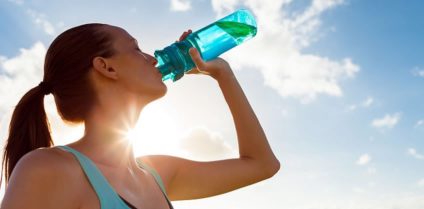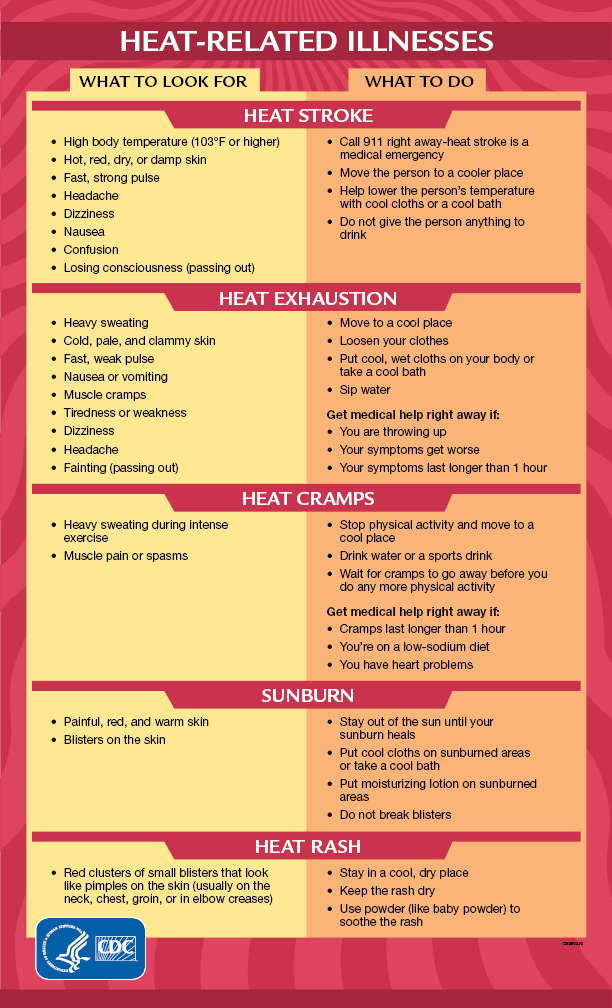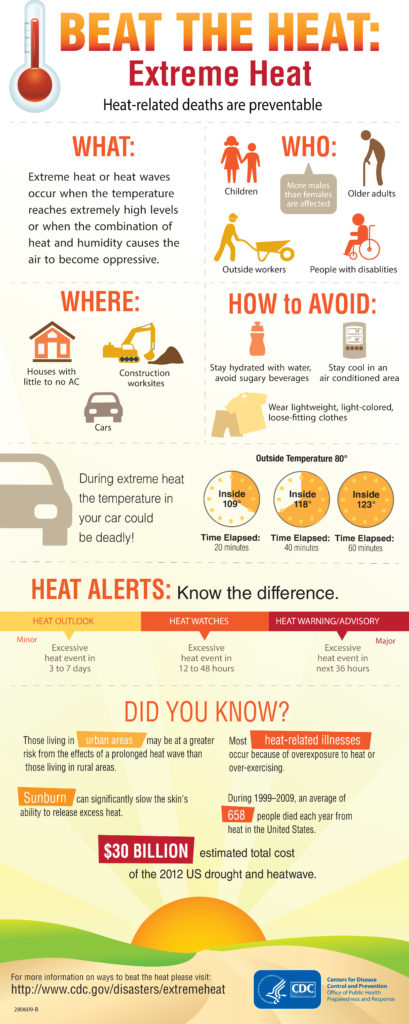The post Holiday Safety Tips appeared first on .
]]>Traveling for the Holidays? Be Prepared
Many people choose to travel during the holidays by automobile, with the highest fatality rate of any major form of transportation. In 2015, 355 people died on New Year’s Day, 386 on Thanksgiving Day and 273 on Christmas Day, according to Injury Facts 2017. Alcohol-impaired fatalities represent about one-third of the totals.
- Use a designated driver to ensure guests make it home safely after a holiday party; alcohol, over-the-counter or illegal drugs all cause impairment
- Make sure every person in the vehicle is properly buckled up no matter how long or short the distance traveled
- Put that cell phone away; many distractions can occur while driving, but cell phones are the main culprit
- Properly maintain the vehicle and keep an emergency kit with you
- Be prepared for heavy traffic, and possibly heavy snow

Even Angel Hair can Hurt
Decorating is one of the best ways to get in a holiday mood, but emergency rooms see thousands of injuries involving holiday decorating every season.
- “Angel hair,” made from spun glass, can irritate your eyes and skin; always wear gloves or substitute non-flammable cotton
- Spraying artificial snow can irritate your lungs if inhaled; follow directions carefully
- Decorate the tree with your kids in mind; move ornaments that are breakable or have metal hooks toward the top
- Always use the proper step ladder; don’t stand on chairs or other furniture
- Lights are among the best parts of holiday decorating; make sure there are no exposed or frayed wires, loose connections or broken sockets, and don’t overload your electrical circuits
- Plants can spruce up your holiday decorating, but keep those that may be poisonous (including some Poinsettias) out of reach of children or pets; the national Poison Control Center can be reached at (800) 222-1222
- Make sure paths are clear so no one trips on wrapping paper, decorations, toys, etc.; NSC provides tips for older adults on slip, trip and fall protection
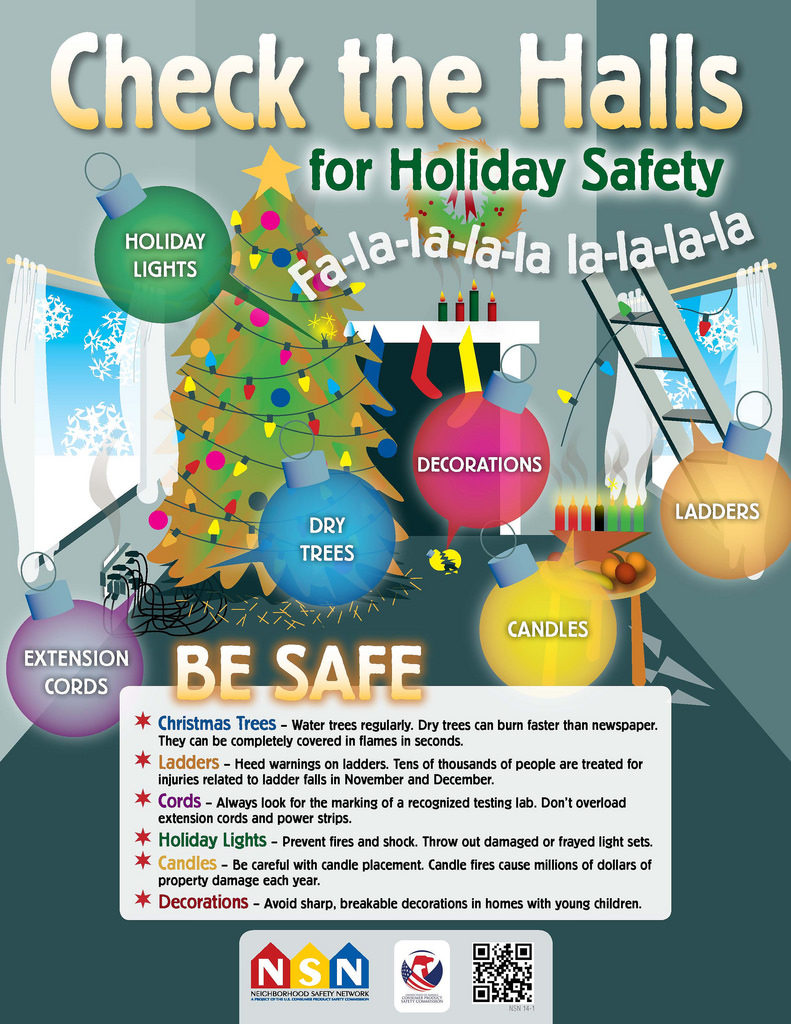
It’s Better to Give Safely

We’ve all heard it’s important when choosing toys for infants or small children to avoid small parts that might prove to be a choking hazard. Here are some additional gift-related safety tips:
- Select gifts for older adults that are not heavy or awkward to handle
- Be aware of dangers associated with coin lithium batteries; of particular concern is the ingestion of button batteries
- For answers to more of your holiday toy safety questions, check out this Consumer Product Safety Commission blog
- Be sure to check which toys have been recalled
Watch Out for Those Fire-starters
Candles and Fireplaces
Thousands of deaths are caused by fires, burns and other fire-related injuries every year, and 12% of home candle fires occur in December, the National Fire Protection Association reports. Increased use of candles and fireplaces, combined with an increase in the amount of combustible, seasonal decorations present in many homes means more risk for fire.
- Never leave burning candles unattended or sleep in a room with a lit candle
- Keep candles out of reach of children
- Make sure candles are on stable surfaces
- Don’t burn candles near trees, curtains or any other flammable items
- Don’t burn trees, wreaths or wrapping paper in the fireplace
- Check and clean the chimney and fireplace area at least once a year

Turkey Fryers
While many subscribe to the theory any fried food is good – even if it’s not necessarily good for you – there is reason to be on alert if you’re thinking of celebrating the holidays by frying a turkey.
The Consumer Product Safety Commission reports there have been 168 turkey-fryer related fires, burns, explosions or carbon monoxide poisoning incidents since 2002. CPSC says 672 people have been injured and $8 million in property damage losses have resulted from these incidents.
NSC discourages the use of turkey fryers at home and urges those who prefer fried turkey to seek out professional establishments or consider a new oil-less turkey fryer.
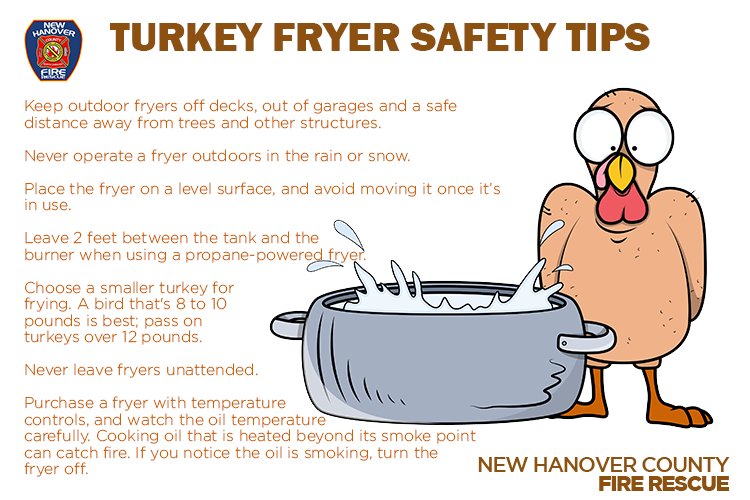
Don’t Give the Gift of Food Poisoning
The U.S. Department of Health and Human Services provides some holiday food safety tips. Here are a few:
- Do not rinse raw meat and poultry before cooking
- Use a food thermometer to make sure meat is cooked to a safe temperature
- Refrigerate food within two hours
- Thanksgiving leftovers are safe for four days in the refrigerator
- Bring sauces, soups and gravies to a rolling boil when reheating
- When storing turkey, cut the leftovers in small pieces so they will chill quickly
- Wash your hands frequently when handling food

Have a Very Happy And Safe Holiday Season!
The post Holiday Safety Tips appeared first on .
]]>The post Be Active In Warm Weather Safely appeared first on .
]]>There is a risk of heat related sickness and even fatalities in hotter weather. According to the Centers for Disease Control and Prevention, from 2004 to 2018 an average of 712 heat-related deaths occurred in the U.S. annually, and extreme heat sends more than 65,000 Americans to the emergency room each year.
There are things you can do to prevent heat stress and the risks that come with hotter weather.
Effects of Heat
Heat can cause minor symptoms, such as heat cramps, to life-threatening conditions such as heat exhaustion and heatstroke. Before we look at these, let’s examine the body’s natural mechanism to regulate body temperature: Sweating. The hypothalamus, a part of the brain, helps govern the body’s baseline temperature (roughly 98.6 F). When your temperature becomes too high or low, the brain sends signals to organs, muscles, and the nervous system to do what it needs to do to get the body back to normal. (sweating, shivering, etc.)
Temperatures of more than 104 F combined with relative humidity of 60% can weaken the body’s cooling mechanism and can affect the body’s ability to function. This can cause damage to the brain and major organs. This is why ignoring heat, and ignoring the first signs of heat stress can lead to dangerous conditions and even death.
Heat Symptoms
These are some of the common symptoms to look out for:
Heat Cramps typically occur after intense exertion in high heat and cause thirst, sweating, fatigue, and painful cramps in the arms, legs, or abdomen.
Heat Exhaustion is brought on by excessive loss of salt and water. It can result in weakness, headache, thirst, vomiting, muscle cramps and dizziness. If treated promptly, the symptoms typically last 30 to 60 minutes or less, with complete recovery within 24 to 48 hours.
Heatstroke occurs when the body loses the ability to sweat and fails to cool down. It is a life-threatening condition and needs urgent medical attention. Symptoms include hot and dry skin, high fever, rapid heart rate, confusion, fatigue, dizziness, nausea, seizures, and unconsciousness. Without promptly addressing symptoms, heatstroke can cause damage to the brain and internal organs, and death.
Who’s At Risk
When we look at the groups that are at highest risk for heat injury, they include the very young, the very old, people who are less fit, and those who partake in extreme sports for long periods. Additionally, people who are obese, have chronic medical conditions, who are on certain medications, work outdoors, or who work in hot indoor conditions can also be at higher risk.
Prevention
Preventing heat injuries can be accomplished by proper preparation and good preventive care. I was a fitness fanatic when I was in the Army, and I know my better fitness helped me deal with the heat more easily. I also made sure to stay hydrated. And maybe I’m just less prone to heat injuries than some, as heat has never really bothered me much. Here are a few things you can do to reduce risk.
Dress light and wear a hat. Lightweight, light-colored, loos-fitting clothing allows air circulation and transfers heat away from the body. Light colors and fabrics such as cotton, loose linen and rayon keep the body cool. Sun protective clothing and a well vented, wide-brimmed hat or a loose cotton bandanna help regulate body heat. And even if you don’t have the “best” protective headgear, anything can be better than nothing. So use whatever hat you have available, and improvise if you must, just protect your head from the sun.
Stay hydrated. This is important, so I’ll say it again, Stay hydrated. Drink plenty of water during hot weather. The more you exercise or exert yourself, the more water you will need. While water is usually considered the best, other fluids will also help you stay hydrated, as well as eating foods with high water content. Foods such as watermelon, strawberries, blueberries, raspberries, tomatoes, cucumbers, cantaloupe, cabbage, celery, spinach and zucchini are not only very healthy for you, but they are also good foods to heat during hot weather to help you stay hydrated.
Limit exertion during hottest times. If possible, refrain from exercising or exerting yourself during the hottest midday heat. Schedule training and work, if you can, during the cooler parts of the day. If you must work or exercise in the heat, shorten the intensity and duration to reduce risk, and wear moisture-wicking fabrics. Stop if you begin to overheat. Get to the shade or inside someplace cool. An icepack to the back of your neck can help you cool down, and be sure to drink plenty of cold water or a sports drink if you prefer.
Be Informed. Pay attention to the forecast to know the temperature and heat index for the times and locations you will be at, and plan accordingly. Summer is a time to have a lot of fun. Just be aware of the heat, how it can affect you, and enjoy your summer safely!
- Suja Natarajan’s article Hot Topic in the July 21 edition of Costco Connection was a source for helping with this article.
- Graphics from CDC
What to Do for Heatstroke
Heatstroke can be life-threatening. Know how to identify early signs and then:
- Call 911.
- Move the person to a shaded and cool area and raise their legs and feet slightly.
- Loosen the person’s clothes and remove unnecessary clothing, shoes, and socks.
- Rehydrate the person with water or a sports drink.
- Lower the person’s body temperature with a cold compress or fans.
- Monitor the person’s temperature every few minutes.
The post Be Active In Warm Weather Safely appeared first on .
]]>The post Stay Safe In Crowds appeared first on .
]]>That’s easy to understand when we are bombarded with angry protesters, riots, active shooters, bombings, natural disasters, and vehicle attacks, all involving crowds of people being injured and killed, constantly in our news media. I can understand why some people choose to never go places where there are crowds of people. And that’s sad, because it is limiting what those people do, and they will miss out on some things that they might otherwise really enjoy.
I want you to always be aware when you are out and about, especially in crowds, and take basic precautions, but I don’t want fear to keep you from enjoying life, or from your basic daily life activities. Here are a few strategies that can help you stay safe in crowds when things become dangerous.
Leave at First Signs Something is Not Right.
At the first sign of danger, leave the area immediately. This might seem obvious, but too many people rubber neck to get a better view to see what is happening, or worse these days, pull out their phones to video the ruckus. Getting to safety is much more important than seeing what’s going on or getting a video clip for YouTube. Especially if you are with others and are responsible for their safety too.
This means pay attention to your “gut” feelings or intuition. If you have a feeling that trouble is brewing and something bad may happen, listen to those feelings.
Remain Calm.
With any dangerous situation, or in any emergency, keeping your cool and remaining calm will help you get through it easier. And yes, this is easier said than done for some. Your adrenaline and survival instincts kick in, and you will need to remember to breathe. This is why I teach Combat Breathing (Sometimes called box breathing) in all of my programs, and wrote about it in “Survive A Shooting.” This will help you remain calm and do what you need to in order to survive. Breath in for a count of four, hold for a count of four, breath out for a count of four, and hold for a count of four. Repeat, repeat, repeat… Practice this breathing so you can use it when you need to.
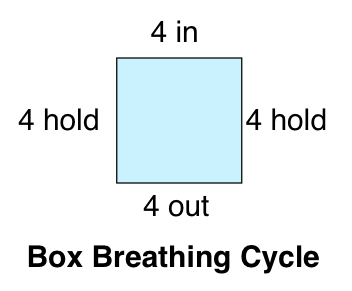
Stay Together.
If you are with others, grip hands or lock elbows and stay close together. Do everything you can to not be separated. If you have a small child, hold him or her so they don’t get separated or trampled. Staying together is a priority, and finding a way to safety for all of you is your primary goal. Stay together and work together toward that goal.
Stay Out Of Riots.
In a riot situation you don’t want to take part. Don’t take sides, help out, or stand out. Try to be invisible and get away from everything as quickly as you can. Remember, your goal is to get to safety. Stay close to walls and other barriers rather than be out in the middle of the crowd. Be wary of bottlenecks, areas where many people are squeezing through a small space. That’s why it is always important to know alternative exits and escape routes.

Drive Away if in a Vehicle.
If you are in a vehicle, stay in the car and drive away as calm and controlled as possible. Try to use streets that are clear of rioting, and avoid the main streets that are congested if you can. Don’t stop, keep moving. If someone tries to block your car, lay on the horn and keep driving until they get out of the way. I don’t advocate hitting anyone, but if they do not get out of the way slowly pushing them out of the way may be your only option to continue. You will have to assess the situation you are in. Be assertive, but not aggressive, with your vehicle, just as taught in any self-defense situation.
Get Away From Riots and Dangerous Situations.
If you are on foot, get away by going with the flow of foot traffic, not against it. It is always harder to move up stream, and if you are going against the flow of traffic you are more likely to stand out, and have greater chances of being stampeded. Do everything you can not to get knocked down in a big crowd as people are killed by being trampled. You can sometimes ride along with the crowd, letting them almost carry you. Being by the walls can also help with support. Try to remain calm and work toward getting to safety without running in panic.
Find a Safe Enclosed Area.
Riots and mobs are usually outside. Finding a building you can enter can often protect you from the riot outside. If you can get inside a safe building and hide from the mob, it can keep you safe. Once inside, stay away from windows and doors. It’s preferable to move toward the center of the building away from the mob outside. Find alternative exits in case you need to escape the building. Also be aware of fire. If the building is set on fire, you will need to escape to safety.
Conclusion.
Being in a riot or angry mob can be scary and dangerous. But being in a large crowd doesn’t have to be either. Many large crowds are people having a good time, or just going from one place to another. The strategies presented here can help you stay safe if things do turn to dangerous. Be smart. Be aware. And enjoy life safely.
The post Stay Safe In Crowds appeared first on .
]]>The post Eliminate Denial, Ignorance and Negligence for Your Safety appeared first on .
]]>important to understand why people become victims in the first place.
Because most of us grew up in societies that have a respect for the
law and other people’s existence and human rights, we have pretty
clear convictions of what is right and wrong. And we then often assume
that everyone else should have these same convictions, and if they
don’t, they are wrong.
This assumption is where people go wrong, because the truth is, there
are many people out there who don’t have the same moral and judicial
convictions. There are people out there who will kill you for your
money or possessions. Remember James Anthony Smith who was killed over
his pair of red-and-white Nike Air Jordans in Washington DC a few
years back? There are people out there who will kill you because they
believe their religion is right and yours is wrong. There are people
out there who will hurt or kill you for fun or “kicks.”
Sometimes bad things happen to good people, and the criminals out
there are looking for good people to do bad things to. And in a small
percentage of incidents, people are just at the wrong place during the
wrong time, and regardless how well prepared or aware, they get caught
in something out of their control. However, in the majority of
situations, in fact in most cases, a proactive approach that includes
planning ahead, as well as taking steps to be a hard and unattractive
target, will allow a person to avoid negative things happening to
them.
Three Reasons People Get Caught In Negative Situations
If most cases can be prevented through a proactive approach, why do so
many people become victims? Here are three reasons:
Ignorance

Ignorance: People don’t like to think or talk about safety and
security because it’s scary. We don’t want to think about being
robbed, raped, hurt or killed. We don’t want to accept that there are
people out there that would do these things to us, and we certainly
don’t want to think about them. We don’t want to consider the worst
parts of human behavior and psychology.
So we avoid thinking about safety and security and remain uninformed
and uneducated on the topic, and therefore lack the knowledge of how
we can be proactive to prevent the negative for occurring.
Negligence

Negligence: The next reason people become victims is negligence. This
is when we know better, and we know what to do, but we don’t out of
laziness or the belief that “it won’t happen to me.” Negligence is
being careless and not giving safety and security the appropriate or
sufficient attention it deserves. A very common example of this is the
failure to lock doors and windows. Many criminals enter residences to
rob through unlocked doors and windows. And you can’t count the number
of times law enforcement officers have heard, “I knew better than…”
or “I knew I shouldn’t have…” or “I knew I should have…”
Denial
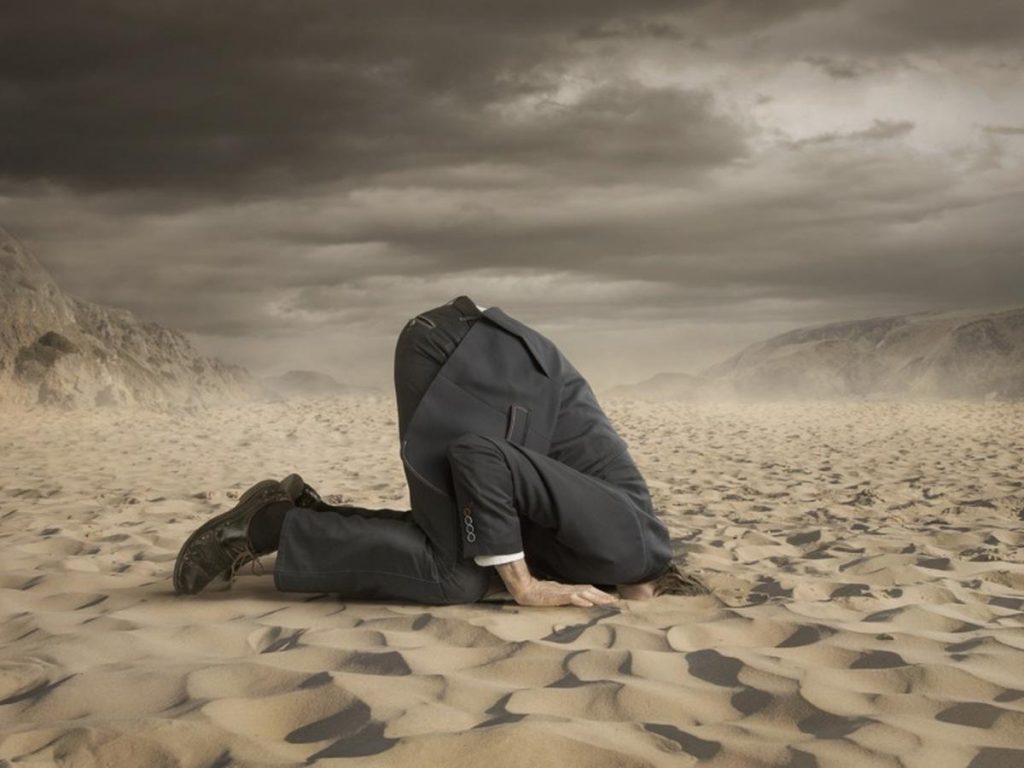
Denial: Ignorance, negligence, and denial combined make people
attractive targets for criminals out there. Denial is a defense
mechanism where we refuse to accept the truth about something. It
often comes from a combination of ignorance and negligence. People
think bad things won’t happen to them, they only happen to others. Or
that bad things won’t happen here.
Bottom Line: We must strive to eliminate denial, ignorance, and
negligence. We must be proactive and aware, and modify the behaviors
that make us vulnerable. We must educate ourselves in how to become
hard targets. We must then put that education into practice so that we
can enjoy life safely.
Thanks to Gavriel Schneider’s book Can I See your Hands: A Guide To Situational Awareness, Personal Risk Management, Resilience and Security for the inspiration and model for this post. Please see his book for a more thorough look at this topic. Check out the book on amazon:
The post Eliminate Denial, Ignorance and Negligence for Your Safety appeared first on .
]]>The post Pay Attention And Not Upside Down appeared first on .
]]>We must pay attention! This is especially true when driving. It’s not just your life and safety, it’s all those on the road with you.
Stay safe! Drive Safe! Pay Attention!
Here are some pictures I took before filming the above video.
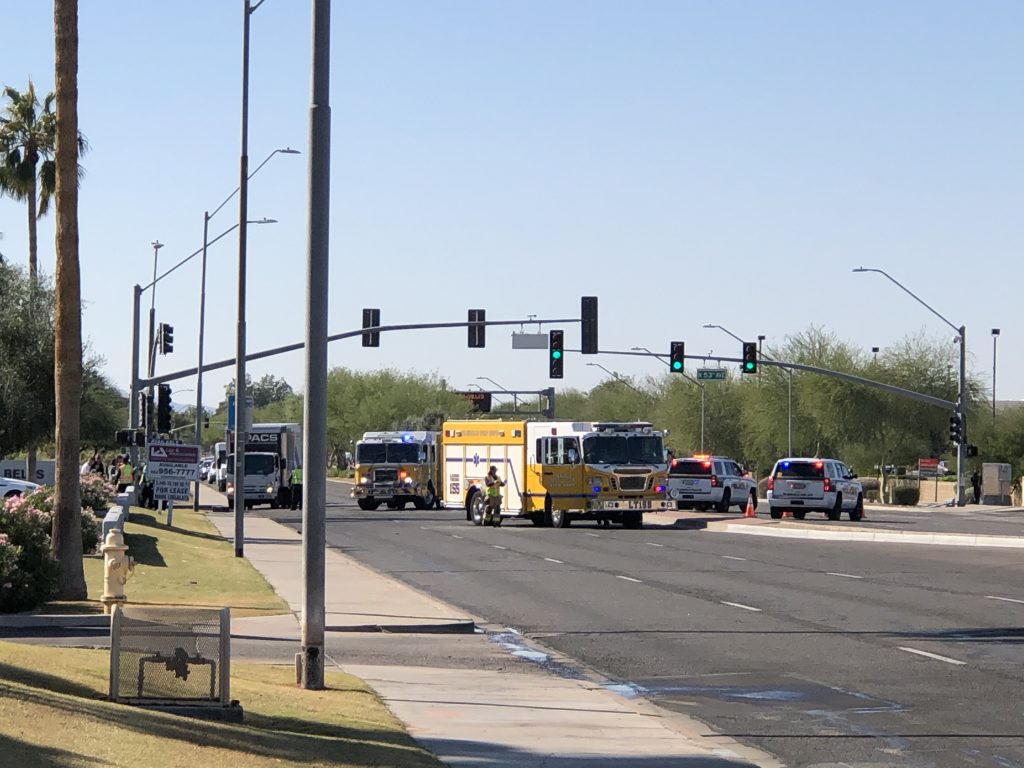
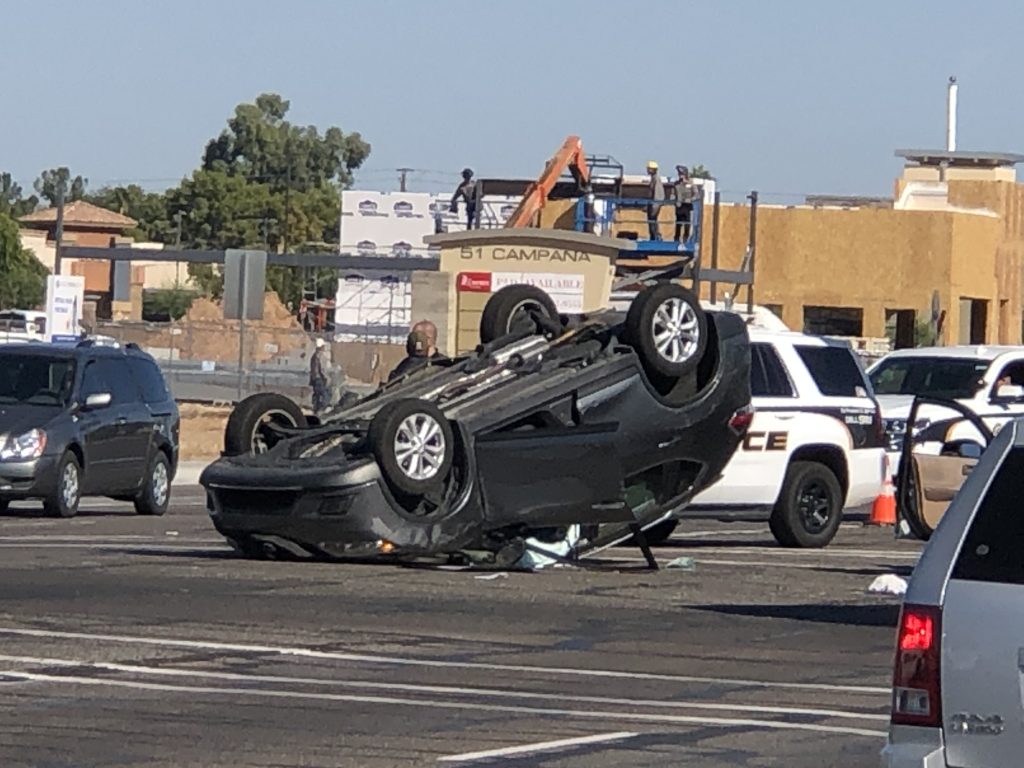
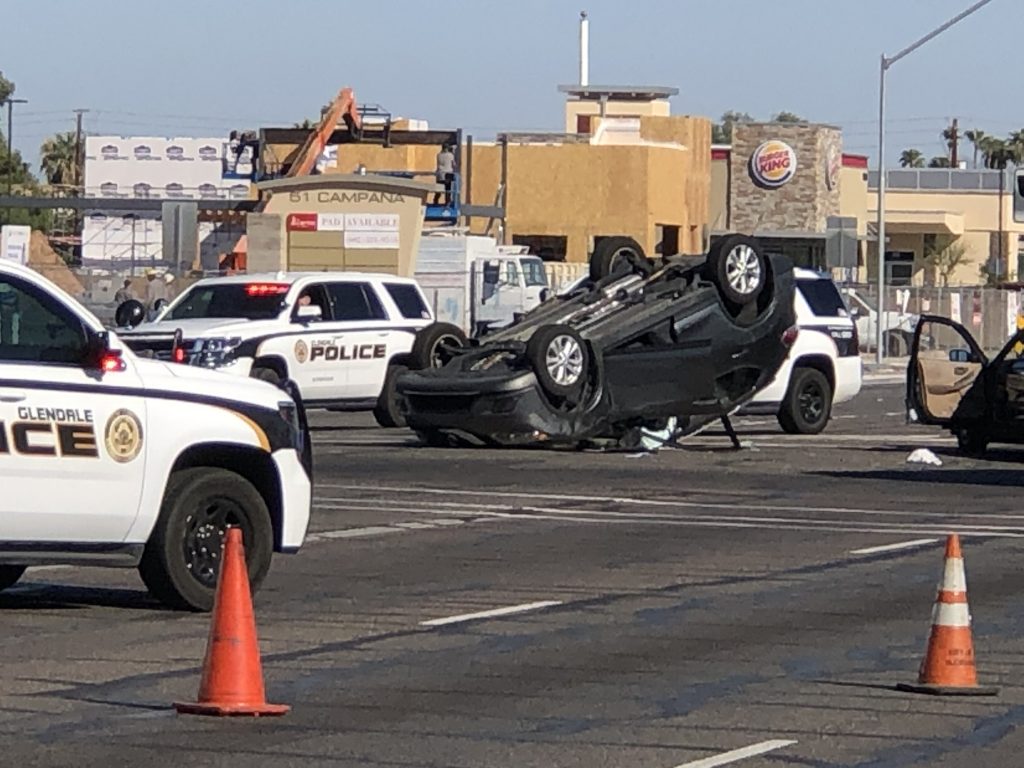
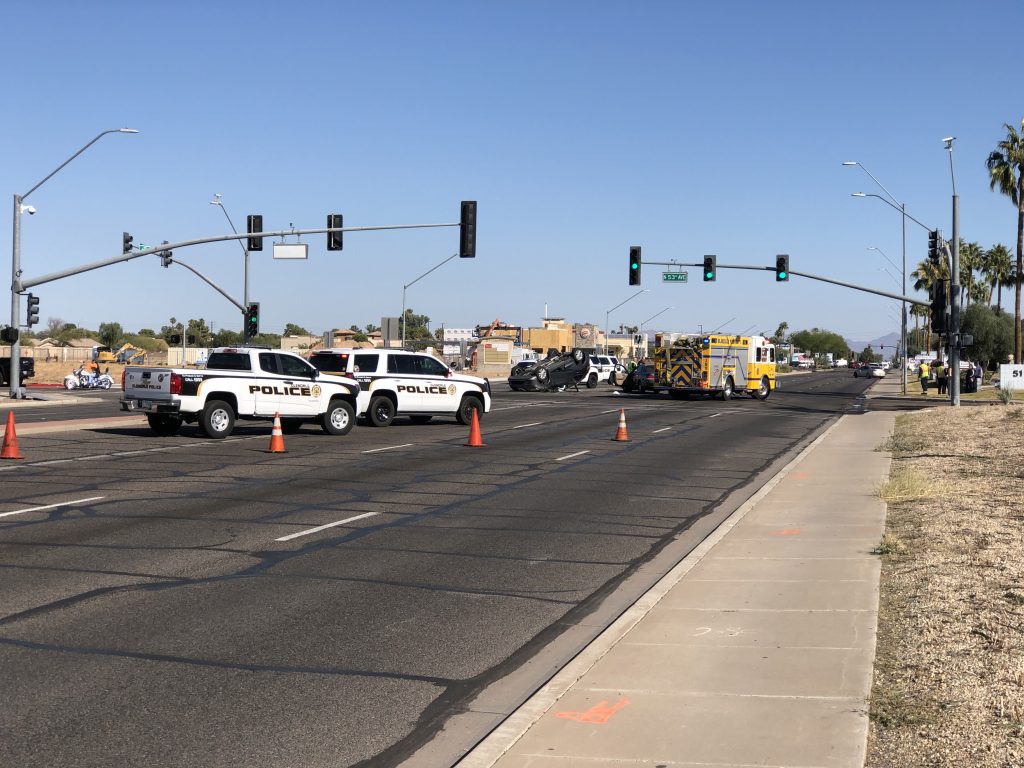
The post Pay Attention And Not Upside Down appeared first on .
]]>The post Tooth Injuries – What To Do appeared first on .
]]>Injuries to the teeth can happen in a self-defense situation, other emergency, or even in training. Trust me, I’ve learned a lot due to a family member’s tooth injury, and you really want to take care of your teeth, and if injured get attention as quickly as possible.
The following should be done immediately, or as soon as possible:
- Clear broken teeth and blood from the mouth with your fingers.
- If the victim is conscious and has no other serious injuries, sit him in a chair with his head tilted forward over a bowl or basin.
- Call 911 and ask for an ambulance, or drive the victim to your local hospital. He should travel sitting up, learning over the bowl.
- Never allow a person who is bleeding from the mouth to lie on his back, because he may choke on the blood.
Obviously, this if for serious injuries to the teeth, not little blood we spit out when hit in the mouth during training. (Or even after real fights.) We do need to be able to tell the difference between serious injuries and minor ones. If you are uncertain how bad it is, err on the side of caution and be sure to get yourself, or the person you are helping, medical attention to be sure.
When a tooth has been knocked out
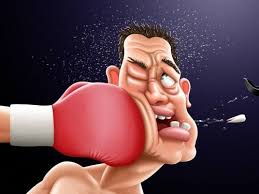
If a tooth is knocked out completely, there may be profuse bleeding from the socket.
- Make a pad slightly larger than the socket from sterile gauze or other clean material. The pad should project slightly above the level of the surrounding teeth.
- Get the victim to put it over the socket and bite on it firmly, spitting out any blood that leaks through.
- If the bleeding still does not stop, call your dentist and ask for emergency treatment, or go to the emergency department of your local hospital.
Saving a knocked-out tooth
It is sometimes possible to save a tooth that has been knocked out of its socket.
The roots must be kept moist, so wrap the tooth in a piece of sterile gauze or clean cloth, dampen it, and place it is a container over ice for the trip to the hospital or dentist.
Some dentists provide these steps to save a tooth:
If your tooth does end up on the ground, the first step is: Find the tooth! This might be harder than it sounds, especially if you are a little dazed by what just happened, but have others help you.
If you can, gently place the tooth back in its socket and hold it there until you get to the dentist. Try to place the tooth back in the mouth where it fell out, so it is level with other teeth. This is a little easier with front teeth. Bite down gently on gauze or a wet tea bag to help keep it in place. Be careful not to swallow the tooth.
If this is not possible:
- Hold the tooth by the crown – not the roots
- DO NOT rinse the tooth with water (or anything else) because biological agents on the surface of the roots may help them reattach in the mouth
- Do keep it moist. Your saliva is actually the best wetting agent, so either hold it in your mouth or spit into a container and put the tooth in it
- If milk happens to be available, it is a good solution for keeping a tooth moist
What about a toothache?
Obviously, see a dentist as soon as possible. The level of pain will dictate the immediacy of seeing a dentist, but I do recommend not to wait too long, even if the pain doesn’t seem too severe. If it’s at night or on the weekend, look for dentists offering emergency services. (This will probably cost a lot, so some will want to consider that, but don’t let money, or lack of it, result in worse damage to your teeth or health.)
While waiting to see the dentist, relieve pain with analgesics such as aspirin in recommended doses. Other things you can try are holding a mouthful of ice-cold water or a mouthful of hot, salty water (one teaspoon of salt in a glass of water). Hold the water in your mouth for at least five minutes, spitting it out and renewing it as necessary, and repeat the treatment every 2 to 3 hours.
Bottom Line
Tooth injuries and toothaches can be extremely painful, and they can be very serious. Do what you can immediately, and seek professional medical attention as soon as possible.
The post Tooth Injuries – What To Do appeared first on .
]]>The post Holiday Safety Tips appeared first on .
]]>Traveling for the Holidays? Be Prepared
Many people choose to travel during the holidays by automobile, with the highest fatality rate of any major form of transportation. In 2015, 355 people died on New Year’s Day, 386 on Thanksgiving Day and 273 on Christmas Day, according to Injury Facts 2017. Alcohol-impaired fatalities represent about one-third of the totals.
- Use a designated driver to ensure guests make it home safely after a holiday party; alcohol, over-the-counter or illegal drugs all cause impairment
- Make sure every person in the vehicle is properly buckled up no matter how long or short the distance traveled
- Put that cell phone away; many distractions can occur while driving, but cell phones are the main culprit
- Properly maintain the vehicle and keep an emergency kit with you
- Be prepared for heavy traffic, and possibly heavy snow

Even Angel Hair can Hurt
Decorating is one of the best ways to get in a holiday mood, but emergency rooms see thousands of injuries involving holiday decorating every season.
- “Angel hair,” made from spun glass, can irritate your eyes and skin; always wear gloves or substitute non-flammable cotton
- Spraying artificial snow can irritate your lungs if inhaled; follow directions carefully
- Decorate the tree with your kids in mind; move ornaments that are breakable or have metal hooks toward the top
- Always use the proper step ladder; don’t stand on chairs or other furniture
- Lights are among the best parts of holiday decorating; make sure there are no exposed or frayed wires, loose connections or broken sockets, and don’t overload your electrical circuits
- Plants can spruce up your holiday decorating, but keep those that may be poisonous (including some Poinsettias) out of reach of children or pets; the national Poison Control Center can be reached at (800) 222-1222
- Make sure paths are clear so no one trips on wrapping paper, decorations, toys, etc.; NSC provides tips for older adults on slip, trip and fall protection

It’s Better to Give Safely

We’ve all heard it’s important when choosing toys for infants or small children to avoid small parts that might prove to be a choking hazard. Here are some additional gift-related safety tips:
- Select gifts for older adults that are not heavy or awkward to handle
- Be aware of dangers associated with coin lithium batteries; of particular concern is the ingestion of button batteries
- For answers to more of your holiday toy safety questions, check out this Consumer Product Safety Commission blog
- Be sure to check which toys have been recalled
Watch Out for Those Fire-starters
Candles and Fireplaces
Thousands of deaths are caused by fires, burns and other fire-related injuries every year, and 12% of home candle fires occur in December, the National Fire Protection Association reports. Increased use of candles and fireplaces, combined with an increase in the amount of combustible, seasonal decorations present in many homes means more risk for fire.
- Never leave burning candles unattended or sleep in a room with a lit candle
- Keep candles out of reach of children
- Make sure candles are on stable surfaces
- Don’t burn candles near trees, curtains or any other flammable items
- Don’t burn trees, wreaths or wrapping paper in the fireplace
- Check and clean the chimney and fireplace area at least once a year

Turkey Fryers
While many subscribe to the theory any fried food is good – even if it’s not necessarily good for you – there is reason to be on alert if you’re thinking of celebrating the holidays by frying a turkey.
The Consumer Product Safety Commission reports there have been 168 turkey-fryer related fires, burns, explosions or carbon monoxide poisoning incidents since 2002. CPSC says 672 people have been injured and $8 million in property damage losses have resulted from these incidents.
NSC discourages the use of turkey fryers at home and urges those who prefer fried turkey to seek out professional establishments or consider a new oil-less turkey fryer.

Don’t Give the Gift of Food Poisoning
The U.S. Department of Health and Human Services provides some holiday food safety tips. Here are a few:
- Do not rinse raw meat and poultry before cooking
- Use a food thermometer to make sure meat is cooked to a safe temperature
- Refrigerate food within two hours
- Thanksgiving leftovers are safe for four days in the refrigerator
- Bring sauces, soups and gravies to a rolling boil when reheating
- When storing turkey, cut the leftovers in small pieces so they will chill quickly
- Wash your hands frequently when handling food

A Few More Holiday Fire Tips
Have a Very Happy And Safe Holiday Season!
The post Holiday Safety Tips appeared first on .
]]>The post Watching The Eclipse Safely appeared first on .
]]>Here is a clip from the Today Show on NBC with Jeff Rossen discussing watching the eclipse safely (aired on 8/14/17). Rossen visited ICS Laboratories in Brunswick, Ohio, one of the only labs in America accredited to test eclipse glasses for safety, to test different pairs of glasses and see how much sunlight they allow in.
Rossen Report: Watching The Eclipse Safely
Here is another clip from the Today Show on the eclipse (8/16/17)
This clip from ABC‘s Good Morning America (8/16/17) shows some of the emergency preparation going on for the eclipse.
Jeff Rossen looks at the price spiking going on for the eclipse on the Today Show (8/17/17). I saw this personally when I was looking for places to stay in Idaho.
This segment from Good Morning America (8/17/17) shows how places on the Eclipse Path are turning into hot tourist spots.
Today Show (8/18/17) discussing the Eclipse Glass Shortage and what you can still do. Be sure you watch the eclipse safely.
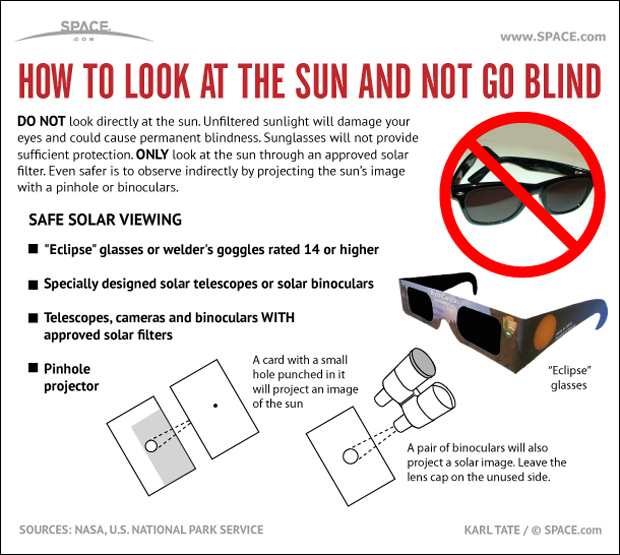
Here is a list provided by the American Astronomical Society of telescope and solar-filter companies that sell eclipse glasses that have been verified by an accredited testing laboratory to meet the ISO 12312-2 international safety standard.
- American Paper Optics (Eclipser) / EclipseGlasses.com / 3dglassesonline.com
- APM Telescopes (Sunfilter Glasses)*
- Baader Planetarium (AstroSolar Silver/Gold Film)* [see note]
- Celestron (EclipSmart Glasses & Viewers)
- DayStar (Solar Glasses)
- Explore Scientific (Solar Eclipse Sun Catcher Glasses)
- Halo Solar Eclipse Spectacles
- Lunt Solar Systems (SUNsafe SUNglasses) [see their unique kid-size eclipse glasses]
- Meade Instruments (EclipseView Glasses & Viewers)
- Rainbow Symphony (Eclipse Shades) [sold out]
- Seymour Solar (Helios Glasses)
- Thousand Oaks Optical (Silver-Black Polymer & SolarLite)
- TSE 17 / 110th.de (Solar Filter Foil)*
Note: Baader Planetarium’s AstroSolar Safety Film and AstroSolar Photo Film, sold in the U.S. by Alpine Astronomical and Astro-Physics, are not certified to meet the ISO 12312-2 international safety standard and are not designed to work as eclipse shades or handheld solar filters. Baader’s AstroSolar Silver/Gold Film, on the other hand, does meet the ISO 12312-2 safety standard for filters for eyes-only direct viewing of the Sun.
The post Watching The Eclipse Safely appeared first on .
]]>The post Practice Safe Habits Today appeared first on .
]]>Too many times we know something is a good idea, and that we should do it, but we put it off until it is too late. This is often true when it comes to my advice to practice safe habits. We know we should. After all, it’s just common sense. Sadly, common sense is not commonly practiced.
I say this because so many times we hear from victims, “I knew I should have…” We must practice safe habits today, not some time in the future. Today is the only day we have. Now is the only time we can do something. Yesterday is gone and tomorrow is in the future. We must make the practice of safe habits a habit. Starting right now and then practice them each and every day.
This is what will help us stay safe. We lock our doors and windows. Make it a habit to do every time. But I’ll just be gone a second. That’s all it takes. I often tell the story of a friend of mine who had her purse, with her Glock handgun inside, stolen from her vehicle. She put the purse and her groceries into the car, and returned the cart to the place you return carts in the parking lot. When she got back to the car after that short period, her purse was gone. It happened just that fast. She knew better, but it was only going to take a second to put the cart back. These things happen.
I share hundreds of short video tips on my YouTube channel, and I have even more on my membership site. Many of these little safety tips are very easy and common sense. But I’ll say it again, common sense is not commonly practiced. We need to stay safe today, right now. Putting off being safe until the tomorrow is a recipe for something bad to happen today.
Bottom line: Practice safe habits today, it may be too late tomorrow.
The post Practice Safe Habits Today appeared first on .
]]>The post Get Your Head Out Of Your Apps appeared first on .
]]>Here is a perfect example from Good Morning America on ABC. (aired 6/9/17)
Thanks to Good Morning America and ABC for footage to remind us to be safe.
The post Get Your Head Out Of Your Apps appeared first on .
]]>